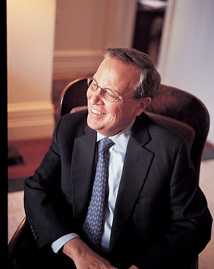 loading
loading
Q&A: Rick Levin“Nothing but upside”An interview with Yale president Richard Levin ’74PhD  Mark OstowView full imageY: You made an unusual statement in your e-mail to SOM announcing its new dean-to-be, Edward Snyder: “Ted is widely regarded as the most successful business school dean in the nation. Still, the SOM community may wonder, as the search committee and I did initially, is the dean of Chicago’s business school the right person for us?” Clearly, you expected some pushback. L: Chicago is very strong in finance and economics, and particularly free-market economics of the Chicago School variety. The focus is training students to be strong in finance or another particular skill. SOM is more oriented toward educating well-rounded business leaders who will have a broad perspective on the role of business in society and are motivated to make a contribution to the wider society. Now that people at SOM have met Ted, I think no one is concerned about the fact that he comes from a business school very different from SOM. Y: You also said in your announcement, “management education faces significant ongoing challenges.” What did you mean by that, specifically? L: There is at the moment considerable public skepticism about the financial services sector. This sector has created great wealth and opportunity for this country, but many lay blame for the current financial crisis on the behavior of that sector. Some even extend that blame to the training financiers received in business schools. In my opinion the crisis was more directly a consequence of defective regulation. It’s time, I think, to rethink the structure of banking and financial sector regulation, and business schools need to be at the center of finding the proper balance between new rules and market forces. Y: Part of SOM’s mission statement reads, “good management can and should promote the greater good.” SOM also has many people researching the psychology of economic behavior—how people make economic decisions—which is now seen as critical to shaping regulation. L: Ted is very interested in behavioral economics, and he’s excited about SOM’s emphasis on the broader society. He has a public service background himself—he served for four years in the antitrust division of the Department of Justice. At the University of Michigan, he led the creation of a center devoted to transforming the economies of Eastern Europe into market economies. He also likes the fact that Yale is a more highly interconnected university than Chicago. He sees great opportunities for SOM faculty and students to work with faculty in the arts and sciences and across the professional schools. Y: What about SOM’s new curriculum? Does he have plans to make further changes? And please sketch the curriculum for the readers. L: The new curriculum reconceptualizes the first year of the MBA program by breaking free from disciplinary organization—finance, accounting, marketing, and so forth—and centering the curriculum on the perspectives of various constituencies: the customer, the employee, the government regulator, the investor. Ted doesn’t feel it’s his job to impose his vision of the curriculum. He thinks the school has done a great job in developing the new curriculum, and he wants to encourage further innovation. So the faculty will continue to review and improve the curriculum, while Ted spends more time connecting the school more closely to the rest of the university and building on the international emphasis at Yale. He finds it very attractive and unique that Yale has internationalized so strategically and with university-wide coordination. Y: He’s regarded as the best in the business, but SOM isn’t considered the best of the business schools. But Yale is saying, forthrightly, “We expect to get into the top five.” L: I think we can do it. We have a strong faculty and one of the strongest groups of students—our GMAT scores are in the top three in the country. We are a little too small, but we’ll grow over time with the new campus. There is nothing but upside for this school. Y: Have you secured funding yet to build the new campus? L: We are getting closer to raising the funds required, and we are operating as if it will happen—moving forward on the planning so that we will be ready to go in the summer. Y: In my experience, administrators never say, “we’re proceeding as if it will happen” unless they are 100 percent sure. L: I am not actually 100 percent sure. But we have discussions under way with some significant donors, so I believe that we are going to get there. In the current environment we don’t want to take excessive financial risk. But on the other hand, I don’t want to slow the process down, because the Corporation [Yale’s governing board] and I believe that this is a high priority. Y: You and I have discussed all the new buildings that have gone up at Yale and the question of how many should be conservative and how many contemporary, and whether you want to leave some significant piece of contemporary architecture as the signature building of your presidency. Norman Foster is a major architect. Is the SOM campus going to be it? L: I love some of the new buildings we’ve built, most especially Cesar Pelli’s Malone Center for Engineering. But there is no doubt that Lord Foster’s campus will be spectacular.
The comment period has expired.
|
|